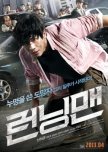
Something refreshing about this latest entry into the action genre must be its noticeable lack of shoot outs and martial arts. Our hero is no "Superman," lacking in most offensive skills; while his talents in escape are second to none, the limits of his body still check him. Jumping through glass storefronts is impossible for him, as is walking away unscathed from falls and hits. The damage steadily accumulates as the movie goes on.
Despite few surprises or shocking developments in the conflict, we're gifted with something unlooked for: a touching father-son relationship. This provides much welcome character development, adding another layer to the entire experience. Genuine humor also colors the script, with several laugh-out-loud moments strewn throughout.
Shin Ha Kyun slips right into the role of Cha Jong Woo, adopting his immature and crude persona seamlessly. Even his physical frame suits the character, as a former con-artist with a need for lithe and smooth movement. On another note (one that speaks to his dedication as an actor), Shin suffered rib fractures which he worked through for some time -- even continuing to do stunts. In the role of his son, we have Lee Min Ho. His Cha Gi Hyuk often served as straight man to slapstick or the foil to the flawed parent he must tolerate. Both of them took on more emotional scenes as well, performing believably apart and brilliantly together.
Fans of Special Affairs Team Ten (and its sequel) will instantly recognize Kim Sang Ho, still portraying a cop. His character seems tailor made for comedy as were his scenes; when paired with the actor playing Chief of Police, they were golden.
Many action films adopt simple soundtracks and Running Man continues the trend. At times, one might only hear natural sounds paired with silence; at others, suitable themes for mystery and brisk action. There are no songs here to add to playlists, but nothing to detract from enjoyment of the film either.
Was this review helpful to you?
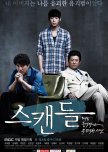
Once the adults age and the children grow, however, the pacing adopts an uneven groove which alternates between satisfying speed and sleepy doddering. Some plot points evolve merely as long chains of people finding out secrets (or not). Several subplots, related to the main story in passing, are explored over time; these often fizzle quickly without much impact, but the characters introduced in them tend to stick around after the fact. Because of the intense focus on the kidnapping and its fallout, these become frustrating due to lack of development. The "romance" between the main couple suffers from this issue as well; their interactions are numerous, but feel hollow and unnecessary. Each secondary couple, some of which are surprising and strangely built, have twice the chemistry and a fourth of the airtime.
However, punch remains to be found. When something big happens, despite being padded down by the aforementioned fodder, it's like an explosion. Crisp cinematography works together beautifully with the wild turnarounds and shifts in dynamic. This drama knows how to swing emotional weight in spades. There are just too many episodes, with too little oomph to distribute over its course.
Of the numerous actors and actresses featured in Scandal, Jo Jae Hyeon offers the most laudable performance. Whatever the role of Ha Myeon Geun called for, he delivered without question. What struck me most was the veracity of emotion and striking normalcy this character exuded. Because of this powerful performance, my sympathies wrapped around this character in spite of his crime. Ki Tae Young also has a fantastic go as second lead, the "other" Eun Joong. His feelings were openly displayed in his eyes and face without exaggeration, a true mark of talent. As for the "primary" Eun Joong, my first experience with Kim Jae Won was a good one. Despite landing a slightly boring character, he elevates the part with good choices and natural charisma.
Park Sang Min confused me, as I have often heard him described as a talent. As Jang Tae Ha, despite an instance or two of strength, he overacted noticeably. Add to this misfortune the desperate attempts to make him look old enough for the role (stuffing him into "grandpa" clothes, dying his hair a new shade every episode). There are also several wasted characters, such as the one performed by Jo Yoon He. Her Wu Ami starts somewhat irritating, steadily improves, then drops in importance as a character separate from the loveline.
Scandal may count its atmospheric and masterfully utilized soundtrack among its strengths. Silences are strewn throughout scenes, allowing for the instrumentals (sometimes moving, others haunting), to shine when played. All of the vocals are memorable as well, with the best offered by Masyta Band ("I Am"), Kim Jin Seon ("Stay") and The Position ("Last Love of My Life").
Was this review helpful to you?

At first (and for most of its duration), Love Around is pleasant and simple. It never attempts to be more than a light-hearted romp centered on relationships. Some bubbles of conflict surface along the way; these are either dealt with swiftly or swept so far to the side as to be partially forgotten. Early episodes are relatively strong, with the warm dynamic between leads generating bright interest. How refreshing to see honest friendship predate romance, rather than the staple: bickering hatred! Though loveline development is slow, it is also remarkably sweet and natural. And the "comedy" paired with "romantic" in the genre tag? This aspect works well enough, with the usual stumbles here and there.
Major problems emerge around episode 15, coinciding with the first extension. Shift in tone swings so wildly toward melodrama as to be startling. Cliche suddenly invades in force, chomping away at most everything previously fun and original. Once the main conflict is remembered and brought to the forefront, it is milked dry quickly. Worst of all, passable pacing ultimately gives way to scenes as tiring as they are repetitive. These extra portions often center on unabashed filler plots and characters, some of which are wholly new. Once the second extension ends the series, one will find the conclusion rushed though rewarding. Admittedly, some of the sweetness comes from the entire experience finally ending.
The cast remains consistently likable despite late-game overcrowding. George Hu plays gentle melancholy beyond expectation, lending much-needed variety to a genre overpopulated by arrogant princes. His chemistry with Annie Chen is unquestionable; they complement each other just as well as everyone says. Her Xiao Shu stands rather sympathetic until the extension removes her spine and pluck, carried onward mostly by her innate affability. The second leads are a mixed bag, with Jack Lee depicting dull Gao Zhe Xuan without much flair of his own. Idol singer Elleya Tao fares much better, molding the spoiled brat archetype into lovable rather than annoying. Her scenes eventually became an unlooked for pleasure (and a bright spot in the extension doldrums).
Heard of singer Bii? If not, Love Around will introduce you. His songs are heavily promoted throughout the drama, from the catchy theme ("Come Back To Me") to inserts ("Nothing To Do With Happiness," "I'll Be By Your Side," a duet with Miu Chu). One of the only non-Bii tracks belongs to none other than Elleya Tao: "I Love You," an infectious upbeat number.
Was this review helpful to you?
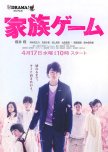
A difficult yet riveting watch, Kazoku Game turns the family genre on its head. As it adopts an uncanny, dangerous atmosphere, one is often left with the feeling something is not quite right. Even when things appear to be going beautifully, the viewer can never truly settle into a sense of well-being. This unshakable near-paranoia bolsters the mystery presented by the story, begging one to question why the Numata family is in such a state, and what the home tutor hopes to gain from his actions toward them. Because this is clearly a fantasy, issues are relatively negligible with the plot. Despite this, I could not help thinking that if anyone did a quarter of what is seen in this drama, they would be shackled in seconds. Potential viewers beware: triggers abound. Violence toward and between children (including intense bullying), sexual assault, and suicide, are concepts of varying visual importance displayed on screen.
Powerful performances from the ensemble must be applauded. Of the actors and actresses which comprise it, none are weak. Few seem to rant about Sakurai Sho as an actor, but his portrayal of the tutor was especially memorable. Whether through his manic cheer or vibrant cruelty, the character springs to (somewhat nightmarish) life with ease. One may never forget the way Sensei swings his arms childishly while walking, or the frozen doll-like smile he offers to others. And his catch-phrase, "Ii, ne!" ("That's good!") is simultaneously menacing and catchy.
Young actors Kamiki Ryunosuke and Uragami Seishu are also notable, capably carrying out their roles as the troubled Numata sons. Uragami-san as Shigeyuki has an honesty about his depiction, true awkwardness and immaturity (good and bad) many will see themselves in. Something of a screen veteran despite his young age, Kamiki-san has a meatier, more complex role. His character has less relatability, but remains fascinating and nuanced because of his fine performance.
Most tunes heard in Kazoku Game are used to boost its eeriness. Brass instruments and a lone, creepy saxophone lead almost all instrumentals. One particular track stood out, partially because it was played so often and also because it was somewhat sinister. Whenever it marked a scene, something cruel was realized or a strange event had taken place; but the tone was cheerful -- aside from the purposely off-tune lead instrument. I also rather enjoyed the theme "Endless Game," provided by Arashi, and the very suitable introductory piece. My only problem with the soundtrack was that it ultimately felt repetitive, but perhaps that was also intentional.
Was this review helpful to you?

Viewers fresh from home or even on the cusp of building their own families may relate most to the tale dictated by Tonbi. The same might be said for those who, already having experienced much of life, are adjusting to empty nests. This drama builds an effectively nostalgic hometown backdrop, complete with unique landmarks and quirky, over-exaggerated denizens. With such a setting, themes and happenings are explored which remain universal despite whichever specific focus is placed on them. The result is a warm, emotional ride which is rather easy to connect with.
Several aspects struck me as slightly uneven nonetheless. The plot relies on various coincidences and, while I can allow for the fact that life sometimes hands out beautiful symmetry, there are too many to shrug. Many point out that Japan stumbles often with romantic love. As expected, few romantic relationships in Tonbi (including one which later becomes a major plot point) felt honestly loving. Because the true focus centers on bonds between parent and child, this is relatively forgivable. Lastly, much of the story is told by son Akira, either through flashbacks or as stories told to others. For the most part this works just fine, but these sequences frequently show characters from their own perspective. While it would be nice to have that level of insight in real life, this staggers somewhat strange. Even for a community of people as open as these, we rarely know everything others experience alone (especially our parents).
Near the start of Tonbi, I spent a reasonable amount of time deciding whether Uchino Masaaki was performing well. His Yasuo is larger than life, initially more like a dumb but lovable hound unable to control itself when excited than an actual person. Yet when all parts of his portrayal are placed together, brilliance flows forth. My favorite bits were his emotional revelations, becoming acquainted with the vulnerability and loneliness of the character. Sato Takeru improves every time I encounter him. His scenes often feel quite natural lately. While his Akira does not induce the same level of interest as Yasuo, the chemistry with Uchino-san makes this drama. A true degree of familial love seems to pass between them, whether they are sharing warm moments or standing in conflict.
Instrumental pieces in Tonbi are light and subtle. There are various gentle themes which play at pivotal moments, particularly those when a character is reminiscing or about to experience change. Overall suitable, the tender and unobtrusive way they are presented is simply wonderful. Fukuyama Masaharu provides the gorgeous theme ("Tanjobi ni wa Mashiro na Yuri wo"), with a voice that croons nostalgia with every syllable. Whenever it played during the final moments of an episode, my heart swelled.
Was this review helpful to you?
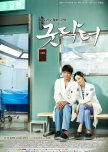
Despite billing itself as a medical drama which features a savant surgeon, Good Doctor evolved into quite a different animal. While it does feature bloody surgeries and a hospital atmosphere, this drama yearns to be an inspiring slice-of-life. Most patients serve as episodic cases and often provide the backdrop for the hospital staff to interact. Though the medical side was handled relatively well, it often felt gimmicky. Developments between the hospital staff seemed much more important to the writers. To their credit, character interaction is where this drama excels. The exchanges may elicit wide ranges of emotions from viewers, anything between sorrow and anger to warmth and joy.
Certain things did not work as intended. Hospital politics feature in most medical dramas, but they were boring and unnecessary in Good Doctor. A particular romantic red herring exists (as they always do), taking up a large chunk of episodes. When things are finally sorted, the "proper" progression initially feels jagged and too quick -- despite the pairing itself being very nice and even desirable. This phenomenon of sudden forward motion occurs also with the lead character, as he moves from extended developmental purgatory to huge successive change. Even these issues are somewhat forgivable though, due to the power and likability of the actors.
As you might have garnered, Good Doctor features an earnestly talented cast. Joo Won shines at the top as gentle-hearted savant Park Shi On. Everything about his performance, from the way he held his body to his speech, spoke of good research and execution. Prickly Kim Do Han is something of an internet sensation, lovingly dubbed Doctor Wook ("anger") by Korean netizens. Joo Sang Wook brings natural charisma to this role, believably building a man colored by both by hardness and secret warmth. Though she was handed a character with little back story, something about Moon Chae Won just clicks. Her Cha Yoon Seo might dole out less impact, but she serves her purpose well. All three have wonderful chemistry, in any combination. Of the supporting cast, nearly everyone involved with the hospital politic aspect of the plot felt wasted. This is especially true of Kim Min Seo, Na Young Hee, Chun Ho Jin (who always seemed thunderstruck).
Many musical tracks were great, especially instrumental pieces. Various themes adopt an ethereal quality and a nonsense language reminiscent of Yuki Kaijura; these are masterful. Unfortunately, traditional vocal pieces are far more numerous than expected. This led to many forgettable ballads; during a particular episode, they actually stuffed every single into the action -- and topped the final scene off with an entirely new song! Despite this slight overcrowding, most were at least decent. Standouts include "I Am In Love" (2BiC), "How Come You Don't Know?" (Kim Jong Kook), and late game offering "Love Medicine" (Joo Won).
Was this review helpful to you?

Despite flirtation with the idea of what it means to be a woman, core themes center around poverty, motherhood, and family (fractured and/or 'whole'). Many will find parallels with real life, uncanny sparks of the every day between each character interaction or plot motion. Though the story can be depressing, sometimes unrelentingly so, rays of hope peek through from unlikely places. The slow pace also works well, allowing for quiet sequences and subtle explosions to be worked in without unevenness. Unfortunately, well written as I found it, there were times an event or character seemed superfluous. A glaring example of this would be the welfare worker and his wife. Their tale felt unimportant and tacked on, the purpose served more thematic than necessary -- and even then, other characters had already fulfilled this aspect well. The Shiori character was perhaps a bit underdeveloped in the end, but her place in the plot was decidedly important.
Where have they been hiding Mitsushima Hikari? If the rest of her work is as vibrant as her portrayal of Koharu, it wouldn't be far-fetched to name her among the best actresses in Japan. Mitsushima-san delivers lines as if they were second nature; her gestures and body language are subtle and real. She positively carries this drama, though her work brought up the performances of others as well. The young ones depicting the Aoyagi children are also an absolute joy to watch. More than just precocious cuties paid to be tiny versions of adults, each of them felt like actual children. They babbled and asked questions endlessly, they cried without reason, they understood more and less than adults might want. This was especially true of Suzuki Rio, as the older Nozomi.
Fans of Oguri Shun should be happy with his solid performance, but will not want to watch Woman primarily for his sake. Shun-san is primarily seen through flashbacks, and though his character is important enough to warrant a spot as a main character, it is in the same way as a literary character might be labelled as such. The absence of his Shin is what pushes the basic conflict. There is a particular scene including him which had me bawling, though.
Musically, the drama stands strong. Orchestrations felt well-placed, especially in those scenes meant to be pivotal. These are also marked by unusual but interesting cinematographic sequences, such as an intense slow motion bit, set to an older song called "Believe." These instances were a little disconnected from the rest of the drama, but strangely effective. Though the sound of the theme song ("Voice" by androp) does not initially appear suitable, the lyrics tell another tale.
Was this review helpful to you?
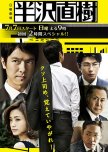
Hanzawa Naoki treads the waters of Japanese financial culture, following a brilliant man who dove in after experiencing its volatility firsthand. The main body of the tale begins once this man, Hanzawa, has established himself at the management level of a certain bank. We follow him through two intense loan crises, each taking five of the total ten episodes. While the first, occurring in Osaka, is truly excellent, this drama shines most brightly in the second (Tokyo). Everything feels tighter, more intense, and more character development occurs; the first half is merely beautiful set-up in comparison. If you feel daunted by business talk, don't worry. With a clear narrative careful to explain everything, Hanzawa Naoki is very accessible. Long story short, this is an intense and unpredictable drama -- sure to get hearts pounding and fists pumping. Bring on a sequel, I say!
Sakai Masato, one of the finest actors currently working in Japan, is the real draw here. As Hanzawa himself, Sakai-san oozes nuance and dynamic characterization. How hard it must be to portray this samurai-like banker, full of ferocity and compassion at once! But he makes it look easy, with his sharp and seemingly effortless performance. Even his delivery of the now-famous catchphrase: "If you screw me, I'll screw you back. It's double the payback!" induces goosebumps.
Of the supporting cast, Takito Kenichi (troubled Kondo) and Oikawa Mitsuhiro (cheerful Tomari), are memorable as Hanzawa's old compatriots. Their chemistry with Sakai-san is really wonderful, especially during the Tokyo arc. Some intense kendo practices occur between Hanzawa and Kondo, making for telling character interaction. Also featured, veteran Kagawa Teruyuki rounds out the talent as deliciously two-faced Owada.
Sweeping, dramatic instrumentals fill every scene. They are of a cinematic quality, perfectly placed, and unique. Without realizing it, I recently found myself humming the theme song while doing laundry. Though there are no traditional vocal pieces, you won't even notice.
Was this review helpful to you?
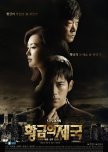
As a period piece, Golden Empire explores harsh years in Korean history. While we are enfolded by this unique atmosphere, the opulent poison represented by the Choi family's own corporate power and wealth begins to take hold. Managing to be highly personal and impactful (even as it tackles complicated business affairs), this is a drama without cliche. Potential viewers should note only negligible romance is present. A few dalliances do exist, but these are far from sweet. For instance, one of the first and foremost openly compares its trajectory to the ill-fated connection between Eva Braun and Hitler. Of the heavily explored ties, family and business are king. Don't expect fuzzy heart flutters here; in the world of Golden Empire, loved ones stab you in the back for even one more share and prison is just another business trip.
Some imperfections exist admittedly; early episodes are strewn with time skips and somewhat confusing cinematographic cuts. It took about five hours submerged in this drama for me to find my footing and solidify my understanding of the plot. Once I could, the rest of the experience was riveting.
The leads offer juggernaut performances. Go Soo becomes Jang Tae Joo with almost theatrical flourish, building him impressively. This character represents the unpredictable, behaving radically in the race for money and influence. As such, his portrayal adopts a delightful and intoxicating element of controlled volatility, comparable to a lightning strike. It was a pleasure trying to figure out what he might say next and just how. Son Hyun Joo and Lee Yo Won embody the brilliant, but tragically flawed Choi cousins. Both of them had an amazing ability to begin friendly conversations and end them with figurative claws out. Out of the three addressed in this section, the persistent Min Jae (Son Hyun Joo) captured my attention without fail. His scenes comprise some of the most dynamic I've encountered in any drama; truly, both character and actor are highlights. Watch out for any scene including even two of these talents; it's guaranteed to be thrilling, especially if it includes both men.
Orchestrations were generally well applied, often serving to add that extra punch to a scene. The best description that can be made of them "moody, elegant, and high drama." Beyond the incredible introductory piece though, I'm not sure any of them make for good post-view listening. Vocals are another story, with Yeon Gyu Sung ("Crying"), ALi ("In My Dream"), and Sun Soo Jin ("Shout to the World") serving up some of the best I've heard all year. Despite romantic lyrics occasionally inappropriate to the series, but hey, they sound great.
Was this review helpful to you?
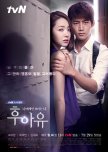
Though opening with an auspicious premise, execution is shaky at best. Cliches and obvious plot contrivances riddle the story with holes. Because Who Are You attempts realism even while necessitating the suspension of disbelief on other fronts, some token of veracity should be offered. Unfortunately, no venue ever offers this oasis. Police elements felt silly at best, but as a second poorly handled aspect (the coma) forces writers to realize it as such, a vicious cycle begins. The ghosts manage to be the most acceptable, though somewhat unimpressive, part. In the face of such stumblings, some interest remains at the heart of the main plot line. What happened to Lee Hyun Joon? This question acts as the life preserver which keeps everything else afloat.
It should not surprise then, that Kim Jae Wook owns the entire stage. Given little to say and few interactions to make, his Hyun Joon speaks volumes with the slightest gesture or expression. Many will fall for this character, and who can blame them? Everything riveting about Who Are You links back to him. Leads Taecyeon and So Yi Hyun work passably with people far less fascinating. Gun Woo, though a reasonably nice person, appears to have little life outside the events of the drama; Shi On barely feels like a police officer, let alone valedictorian in her year at the academy. And her series-launching coma...yikes. For all it affected her, they may as well have written it out.
Of the entire soundtrack, very little is memorable. Trickyneko provides one underused piece, “Our Story,” which sets a pleasantly spooky atmosphere.
Was this review helpful to you?
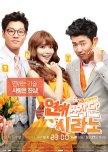
Much of the plot follows the titular agency as they tackle cases. This system produces miniature arcs usually lasting around three episodes. Since each case aims to jump start relationships for supporting characters (often depicted by famous guest stars), various romances are sketched out. Each of them appears to pay homage to a romance type common in dramas (mystery, melodrama, teen, etc). As the series goes on, the cases improve in quality; though still fun, the very first as initiated by the veterinarian was almost silly. Several agency members experience plots of their own, mostly bridging all 16 episodes. Unfortunately, the "main couple" was not to my taste. Age gaps rarely bother me... but lack of chemistry does. Here sparks never fly and, while the romance makes sense on paper, the entire thing felt stilted.
Most performances were solid. Something about Seo Byung Hoon struck me as similar to Sherlock in the recent BBC adaptation; Lee Jong Hyuk has magnetic prickliness down to a fine art. Soo Young spins a potentially cliche weak-spined bore into a refreshingly spunky, strong, realistic woman. Her immediately clear screen presence actually drew me into Dating Agency: Cyrano in the first place. Here I must admit that I fell hard for Lee Chun Hee as "Master". It doesn't make me proud, but whenever he was on screen I often degenerated into a giggling puddle. Whether it's because he played the character so well or because he's drop dead gorgeous, it's hard to say. The rest of the cast performs well, if not memorably. Each guest spot was wonderful too, with Lee Kwang Soo standing out in arguably the best case in the series.
Though eventually it may have become repetitive in a longer series, the soundtrack excels. "Chance!" by The Peppertones burrows into the brain, while Ra.D romances tenderly with "Something Flutters." Most of the instrumental fare felt funky and modern; the intro particularly impresses.
Was this review helpful to you?

What makes Knife and Flower most alluring will be cinematography. Only full length films can compare with the high quality and artistic direction which can be seen in this drama. Occasionally I tilted my head at an edit, but these moments can be counted on one hand. The world looks deep and authentic, though colors dictate mood and atmosphere. And how about the action scenes, you ask? More than impressive, since most of the actors appear trained and capable.
Like the introduction implies, Knife and Flower marries literary archetypes to elements of reality. Many characters actually existed and several events portrayed actually took place (albeit embellished for dramatic effect). The historical backdrop imparts solid atmosphere, bolstering weaknesses with varying potency. I loved how brutality and unrest, definitive of the times, was neither gratuitous nor shied from; the elegance of the story shines because of the deep tragedy marking it. Some problems exist, admittedly. As in Romeo and Juliet, the love line begins dubiously due to chemistry. The entirety of the "Golden Flower Agency" felt underdeveloped, despite its necessity to plot motion. Execution of the time skip initially had me frowning. In the end, everything comes to maturation with surprising clarity and beauty. The viewer will doubtlessly be bitten and drawn in before they even realize.
Performances in Knife and Flower are incredible, many perhaps even award worthy. Choi Min Soo, in his turn as infamous Yun Gae So Mun, hits the master class. He is mysterious, compelling, and intimidating; if a glance could kill, the entire region would drop dead. But the nuance Choi brings to the role could make even the real thing proud. Uhm Tae Woong and Kim Ok Bin are masters of speaking with the eyes. Reserved silence is required of them, but what isn't said is almost as powerful as the implicit. Others of note include No Min Woo (Nam Sang, of beautiful appearance and withered heart) and Ohn Joo Wan (Bo Jang, a more sympathetic echo of Hamlet).
Music must enhance, not get in the way. After the quirked eyebrow misses of the first episode, the soundtrack honestly excels at this. Orchestrations hit the right notes, especially those tied to suspenseful or moving scenes. Wax provides the tearful anthem "Dear Love," and with lyrics so lovely, whether or not it played meant the difference between dry and wet eyes.
Was this review helpful to you?

Three strangers, alienated by society in some way, enter into a love triangle. Share House spins this tried and true formula, having a male lead fancy the other -- instead of the main female. This aspect initially intrigues, but loses charm by the halfway point. Despite some chemistry existing in all directions, none of the possible love lines are handled well. Where romantic feelings exist, they appear to have done so strongly from first sight. We never see "falling in love", and no tension is created by the triangle. A second triangle (comprised of seriously underdeveloped supporting characters) could have been cut without repercussion.
The other theme, alienation, fares somewhat better. I will refrain from making a joke about extraterrestrials now, since there are enough in the drama.
Only one character worked for me (Sakurai), with the other two being snooze-worthy (Shio) or out of this world (Teppei). Sakurai, almost feline and seriously aloof, was easiest to like and sympathize with. His story rang true and actually had me feeling for him. On top of that, the comedic aspect of his character worked most consistently; Tanihara Shosuke has amazing comedic timing. Oizumi Yo does as well and is generally wonderful on screen. It's just the script spent too much time wringing laughs out of his character that weren't there.
Little impression was made by the music, though the vocal by ayaka is noteworthy. It plays at the beginning of each episode, accompanied by a neat intro sequence.
Was this review helpful to you?

My primary problem with the story is that, while highly informative and enlightening, some portions feel like a PSA. Marriage occasionally felt like it was all anyone cared about. On the other hand, a favorite aspect was the charming use of flower language to sum up the theme of each episode. It gave the drama something beautiful and unique.
Strong veteran actors make up the principle cast. Kanno Miho delights as Chiharu, portraying her with likability to spare. She seemed true to life, making human mistakes, suffering little moments of awkwardness, experiencing joys and hurts reasonably. And Kanno-san's smile! It's contagious. Ex-Takarasienne Amami Yuki can already do no wrong in my eyes, but she shone in Kekkon Shinai. As Haruko, she embodies every bit of strength, resolution, experience, and loneliness the character represents. Her work with Kanno-san basically defines chemistry. Last (but not least) we have wonderful Tamaki Hiroshi, the perfect male lead for a drama like this. His performance as the warm-hearted florist Junpei is understated but memorable.
The chosen music generally suits the drama well. Most themes were light and fun, but there were cloying melancholy pieces too. Scenes were well orchestrated, with marked silences for dramatic effect. One vocal stands out, the fitting and catchy Kami Hikouki by Kobukuro.
Was this review helpful to you?
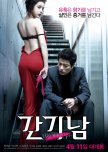
This film is no great whodunit. Despite that, the motivation behind the main crime remained satisfyingly mysterious for a good duration. Had the culprit been less obvious for as long, the story would be a touch more solid. It seemed most conflict came from mistakes the main character made. Detective Kang (Park Hee Soon) was very flawed and had vices to spare; with a little self-control, he’d have seen fewer troubles. I wanted to shake him by the shoulders and ask him to re-examine his life choices.
As mentioned before, there are some comedic aspects to The Scent. Laughs come primarily from members of the police force. They were just so disinterested with the case (despite doing a fine job of actual investigation). Some of them played around and made completely inappropriate jokes when alone. Others were more worried about petty things, like snakes in one scene where searching a field becomes necessary. Detective Kang and his assistant Poong also had their moments.
The Scent marks the first time I’ve taken serious notice of Park Hee Soon in a leading role. He does a fantastic job of making a character with shortcomings likable; it must be his niche. I feel excited at the prospect of seeing him again. Our leading lady, Park Si Yeon, fits the noir femme fatale image to perfection and is an undeniable beauty. Joo Sang Wook plays a memorable “hero;” his detective is everything one should be – and everything Detective Kang is not. Due to his stubborn behavior and hard-nosed perspective, he’s also that guy that everyone makes fun of when he leaves the room. Lastly, Running Man’s Lee Kwang Soo as Poong is pure fun…despite not having a lot of scenes. He definitely stole the limelight when did have them, though.
Was this review helpful to you?






















